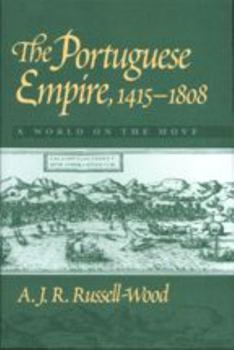The Portuguese Empire, 1415-1808: A World on the Move
Select Format
Select Condition 
Book Overview
Winner of the Dom Jo o de Castro Prize for Portuguese History This is the story of the first and one of the greatest colonial empires: its birth, apotheosis, and decline. By approaching the history of the Portuguese empire thematically, A. J. R. Russell-Wood is able to pursue ideas and make connections that previously have been constrained by strict chronological approaches. Using the study of movement as a focus, Russell-Wood gains unique...
Format:Paperback
Language:English
ISBN:0801859557
ISBN13:9780801859557
Release Date:July 1998
Publisher:Johns Hopkins University Press
Length:384 Pages
Weight:1.20 lbs.
Dimensions:0.9" x 6.0" x 9.0"
Customer Reviews
5 ratings
An illuminating record of global exploration
Published by Thriftbooks.com User , 17 years ago
Well written and researched. From the preface to the last chapter the learner in you will be rejoicing. A great account of one of histories great exploration eras and the impact on the exploring nation and those they came in contact with. Great job.
Portuguese worldwide impact
Published by Thriftbooks.com User , 17 years ago
What an empire, the first truly global empire! The Portuguese impact and acheivements in the world deserve greater recognition and this book will detail them. Before the British, the Dutch and the Spanish the Portuguese had achieved so much. Even today the past can be seen all over the world.
Fascinating!
Published by Thriftbooks.com User , 20 years ago
This is a lively account of the Portuguese sea discoveries in the 15th and 16th century, arriving at new lands and meeting new people, the trade and other exchanges that followed, all presented in a most interesting manner. Movement, colour, adventure make this book engaging reading. I also have Hermano Saraiva' s "Portugal a Companion History", another excellent book. I think they go very well together, one for the overseas history the other for Portugal itself. These are two books that bring history to life.
Fascinating and informative reading
Published by Thriftbooks.com User , 20 years ago
This book on the Portuguese history overseas is not a boring record of past events but a lively account of the intense movement of the Portuguese in the so-called Age of Discoveries, from Madeira to Brazil, to Japan and to Korea. It is a fascinating and well-documented record of the constant flow of people and commodities between Portugal and Africa, Asia and America. The superb illustrations help bring to life this constant flux and reflux. I have thoroughly enjoyed reading this book and am very happy to recommend it to anyone interested in Portugal and its people,of today and yesterday.
Another Great Introduction
Published by Thriftbooks.com User , 21 years ago
In terms of scope of work, Russell-Wood's Portuguese Empire -World on the Move is a welcome addition to the "holistic" study of Portuguese overseas enterprise. To be sure, Portuguese scholarship has "caught up" with developments in Western historiography in the last two decades or so; there is also no shortage of area studies. Yet coverage remains uneven and this is especially so where English works on the subject is concernedIn terms of Western historiography, global history remains a nascent field. The diversely and globally located formal and informal enclaves does not mean that the overseas experiences belong to the Portuguese people alone, they were not to be claimed exclusively by Asians, Africans or Brazilians either; but as one scholar remarked -it was a shared memoryLike its more "matured" British counterpart, Portuguese history is increasingly interacting with indigenous and primary sources. Russell-Wood's Portuguese Empire is built on largely secondary sources, as expected; including afew Portuguese primary materials. Mastering the languages and the necessary paleography remains a daunting task for any historian. Eventhough the perspective might be Portuguese, the issues dealt with are global in nature; qualifying it in the category of world history. Russell-Wood also clarified from the beginning that he will not be probing too much into the political-administrative-military aspect but with explore the technologies, geography, demography, economics, ideas and dynamics of ecology (ie flora, fauna and disease)In terms of perspective, the Portuguese Empire does indeed take on a "new history" approach, looking not only at the business of "the high class" in society (ie administrators and clergy) but also at the individuals and the voicelessWhether in terms of human experience or traffic of goods, Russell-Wood has woven the international nature of the Portuguese empire well into the book. In an illustration of the former, there was a father and son team who were given appointments from Brazil to Africa to Goa and Macao and even returning briefly to Portugal to participate in the War of Spanish Succession (p 70-1). In the terms of trade, cloves from Ternate were carried to Malacca, to Cochim, then to Lisbon, reloaded there for Morocco and exchanged for wheat which became a further part of the exchange system of the South Atlantic (p 134). Excellent maps and tables were also interspersed in the book to explain the flow and traffic of commodities exchanged between the Portuguese and their hosts or that of the complicated wind system of the Atlantic or Indian OceanIn some ways, the largely non new primary resource based and reinterpretative nature of the book meant it will still resonates afew outdated ideas. For example, the book continues to portray a planned approach by which the Portuguese were undertaking their overseas enterprise (p 21). Even the historians of the more "successful" British are conceiting that the formation of its First Em





